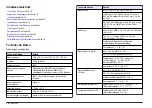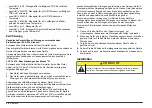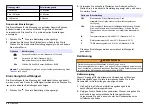
The new settings are automatically stored in the meter.
Calibration
W A R N I N G
Chemical exposure hazard. Obey laboratory safety procedures and wear all of
the personal protective equipment appropriate to the chemicals that are handled.
Refer to the current material safety data sheets (MSDS) for safety protocols.
Calibration procedure
This procedure is for general use with liquid calibration solutions. Refer
to the documents that are included with each probe for additional
information.
1.
Pour the buffers or calibration solution into the labeled calibration
tubes.
2.
Rinse the probe with deionized water and put the probe into the
appropriate calibration tube. Make sure that there are no air bubbles
under the probe tip.
3.
Push . The parameter flashes.
4.
Use the arrow keys to change the parameter, if applicable.
5.
Push to select the parameter.
6.
Push the arrow keys to select the appropriate standard solution. For
pH, the buffers are automatically recognized.
7.
Push to measure the calibration solution.
Note: For pH, the next calibration solution is shown. For conductivity, use one
calibration point. Select the standard nearest to the expected measurement
range.
8.
Rinse the probe with deionized water and put the probe into the
second calibration tube, if applicable. Make sure that there are no air
bubbles under the probe tip.
9.
Push to measure the second calibration solution, if applicable.
The next calibration solution is shown.
10.
Rinse the probe with deionized water and put the probe into the third
calibration tube. Make sure that there are no air bubbles under the
probe tip.
11.
Push to measure the third calibration solution, if applicable.
When the calibration is good, the display briefly shows OK and then
goes to the standby mode.
Note: To calibrate with only 1 or 2 standards when additional standards are
supplied, push
after the first or second standard is measured.
View the calibration data
Data from the most recent calibration can be shown for pH, ORP and
conductivity.
1.
Push .
2.
Use the arrow keys to change the parameter, if necessary, and push
.
3.
Push
and
at the same time. The calibration data is shown:
• pH—the slope and offset values are shown alternating with the
deviation (in %) and calibration temperature.
• ORP—the measured mV value and calibration temperature are
shown.
• Conductivity—the cell constant and calibration temperature for
each standard are shown.
Restore the factory calibration
The user calibration can be erased and the factory calibration restored
for pH, ORP and conductivity.
1.
Push . The parameter flashes.
2.
Use the arrow keys to change the parameter, if necessary.
3.
Push and hold until
OFF
is shown.
The factory calibration for the selected parameter is restored.
Adjust the calibration
The instrument can be adjusted to read a specified solution value for pH,
ORP and conductivity.
1.
Rinse the probe. Put the probe in the solution.
2.
Push to read the value of the solution.
3.
Push . The parameter flashes.
English
11
Summary of Contents for sensION+ EC5
Page 194: ...TDS 0 00 o 4 44 0 64 5 CE 194...
Page 196: ...1 2 3 4 5 NiMH NiMH 1 2 V 1 5 V 2300 mAH NiMH 90 NiMH AA 5 Display Options 196...
Page 197: ...1 IP67 1 1 2 2 2 197...
Page 198: ...3 1 4 2 5 3 3 4 pH1 1 pH ORP 4 2 5 3 198...
Page 199: ...5 DO6 1 DO 4 2 5 3 6 MM110 1 pH 4 2 5 3 6 ORP 199...
Page 200: ...7 MM150 1 5 2 pH 6 3 7 TDS ORP 4 8 8 MM156 1 5 2 pH 6 3 7 DO 4 8 200...
Page 201: ...9 EC5 1 4 2 5 3 6 TDS 5 MSDS pH pH ORP 201...
Page 203: ...1 2 3 4 5 6 pH 7 pH 8 9 10 11 1 2 pH ORP 1 2 3 pH ORP mV pH ORP 1 2 3 OFF 203...
Page 205: ...5 1 2 OFF 3 OFF 1 2 2 3 3 2 205...
Page 206: ...10 10 E1 206...
Page 207: ...E2 250 nA E2 pH 70 105 E2 30 E3 0 05 1 207...
Page 208: ...E3 58 mV E4 E4 TC 0 E5 E6 ErA MM156 50 g L 208...
Page 259: ...0 00 4 44 0 64 5 CE 259...
Page 261: ...2 3 4 5 NiMH NiMH 1 2 1 5 NiMH 2300 90 NiMH 5 261...
Page 262: ...1 IP67 1 1 2 2 2 3 1 4 2 5 3 262...
Page 263: ...3 4 pH1 1 pH 4 2 5 3 5 DO6 1 4 2 5 3 263...
Page 264: ...6 MM110 1 pH 4 2 5 3 6 7 MM150 1 5 2 pH 6 3 7 4 8 264...
Page 265: ...8 MM156 1 5 2 pH 6 3 7 4 8 9 EC5 1 4 2 5 3 6 265...
Page 266: ...5 MSDS pH pH 5 10 5 15 45 15 6 1 2 1013 SAL NaCl 0 Aut MM156 SEn DO 5120 5130 3 274 266...
Page 269: ...5 6 85 C 2 1 2 C F 5 1 2 OFF no 3 OFF 1 2 2 3 3 2 269...
Page 270: ...10 10 E1 270...
Page 271: ...E2 250 E2 pH 70 105 E2 30 E3 0 05 1 271...
Page 272: ...E3 58 E4 E4 TC 0 TC E5 E6 ErA MM156 50 TC 272...
Page 275: ...3 NaCl 33 6 20 2 41 2 25 4 48 9 30 6 56 3 35 8 62 2 40 0 69 4 45 3 75 7 50 0 275...
Page 338: ...TDS 0 00 4 44 0 64 5 CE 338...
Page 340: ...3 4 5 NiMH NiMH 1 2 V 1 5 V 2300 mAH NiMH 90 NiMH 5 340...
Page 341: ...1 IP67 1 1 2 2 2 3 1 4 2 5 ON OFF 3 341...
Page 342: ...3 Measure Calibration Standby 4 pH1 1 pH ORP 4 2 5 3 5 DO6 1 DO 4 2 5 3 342...
Page 343: ...6 MM110 1 pH 4 2 5 3 6 ORP 7 MM150 1 5 2 pH 6 3 7 TDS ORP 4 8 343...
Page 344: ...8 MM156 1 5 2 pH 6 3 7 4 8 9 EC5 1 4 2 5 3 6 TDS 344...
Page 348: ...5 6 85 C 2 1 2 C F 5 1 2 OFF no 3 OFF 1 2 2 3 3 2 348...
Page 349: ...10 10 E 1 349...
Page 350: ...E 2 250 mA E 2 pH 70 105 E2 30 E3 0 05 cm 1 350...
Page 351: ...E3 58 mV E4 E4 TC 0 TC E5 E6 ErA MM156 50 g L TC 351...
Page 354: ...3 mS cm g L NaCl 56 3 35 8 62 2 40 0 69 4 45 3 75 7 50 0 354...
Page 386: ......
Page 387: ......


























